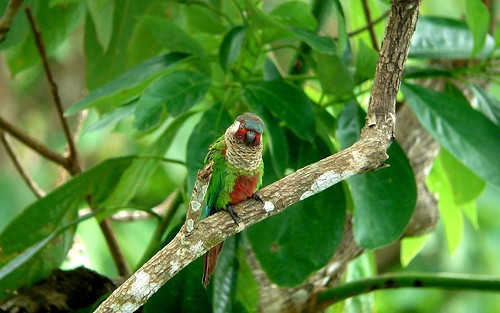Perija parakeet research discovers roost site
 Monday, December 15, 2008 at 3:16
Monday, December 15, 2008 at 3:16  Perija Parakeet. Imge by ProAves ColombiaThe enigmatic and little known Perijá Parakeet (Pyrrhura caeruleiceps) has a highly restricted range of subtropical forest along the Colombian and Venezuelan border. As part of Project Pyrrhura supported by Loro Parque Fundación, ProAves has been working to study a small population surviving in a highly fragmented forest area near the town of Ocaña, department of Norte de Santander.
Perija Parakeet. Imge by ProAves ColombiaThe enigmatic and little known Perijá Parakeet (Pyrrhura caeruleiceps) has a highly restricted range of subtropical forest along the Colombian and Venezuelan border. As part of Project Pyrrhura supported by Loro Parque Fundación, ProAves has been working to study a small population surviving in a highly fragmented forest area near the town of Ocaña, department of Norte de Santander.
Roost site discovered
Recently, ProAves researchers Johana Andrea Borras and Luis Eduardo Urueña discovered the roost site of a group of six individuals of the Perija Parakeet, located in an Avocado tree (Persea americana) approximately 12 metres high with three cavities. Observations include social activities, such as grooming between individuals and fruit eating. Researchers also managed to locate the six individuals feeding range, covering some 247 acres.
Threats - Forest loss, fragmentation and pet trade
ProAves is aiming to determine the current population status and habitat characteristics for this species among other aspects of its natural history. Forest loss and fragmentation are the main threats facing the Perijá Parakeet, but the species is also trapped and held in cages as pets. ProAves has undertaken environmental education activities in the area to prevent further trapping and caging wild birds.
 Pyrrhura caeruleiceps - Perijá Parakeet | in
Pyrrhura caeruleiceps - Perijá Parakeet | in  Conservation
Conservation 
